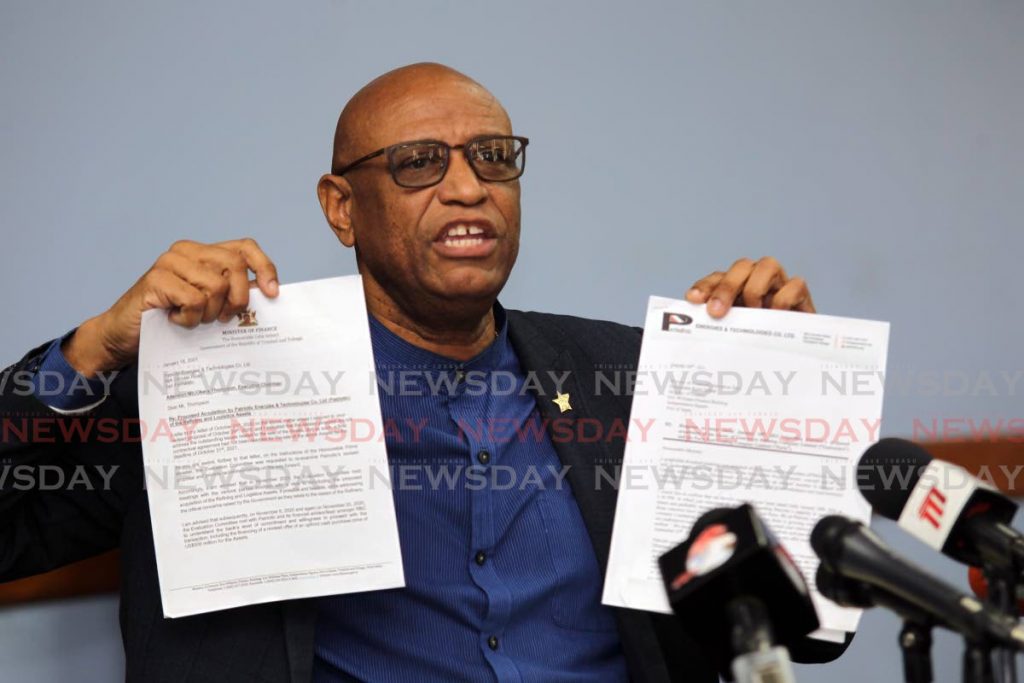What's the real deal on OWTU refinery bid?

As we get closer and closer to the 15-day extension granted by the Minister of Finance for the proposal by the OWTU to purchase the refinery at Guaracara, I have to admit that I get more confused about the whole thing.
To start, the OWTU keeps saying the refinery should belong to “the people of TT,” which sounds very patriotic, but isn’t the purchase going to be made by a company called Patriotic, privately owned by the OWTU? The OWTU is obviously not all the people of TT. Its listed shareholders are members of the union. Not so? So there is something in that avowal that I do not understand to start with.
Then there is their conviction that – if I understand what they have been reported as asking – the lien on the assets should be transferred from Guaracara Refining Co Ltd, which borrowed the money, using its own assets as collateral so as to guarantee the lenders that, if push came to shove, and the company buying (OWTU/Patriotic), heaven forbid, goes broke, they can have the assets to recoup the money lent? Don't all banks insist on that? Wasn’t it Guaracara that borrowed the money and has to pay it back? Or Patriotic, if it takes ownership? Am I not understanding something?
And who holds the lien? One report said that it was a foreign company called Credit Suisse, but that can’t be right, because when I went to Google to find out about Credit Suisse, it said that that company was no longer in private banking, as it had sold out that aspect of its business to Wells Fargo and Morgan Stanley. So, whoever now runs that company has the lien. Is that correct so far?
Is the OWTU assuming that the Government will take over Guaracara’s debt and transfer the lien to a government-owned asset, so that OWTU can buy Guaracara debt-free? Have I got that wrong? If someone wants to borrow money to buy a property that has a lien on it, don’t they have to pay off the lien as part of the “lock, stock and barrel” they are buying? Isn’t a lien the same as a mortgage? Doesn’t the person buying the property have to buy over the mortgage as well? And to have a mortgage, don’t you have to have collateral?
So what will the organisation that will lend US$500 million to the OWTU get as collateral?
Credit Suisse is a highly regarded international financing organisation that is reputedly going through the throes of reorganisation, having sold off its Latin American division to Wells Fargo, which in turn has lost some 60 of its senior investment bankers to Morgan Stanley, which in turn is being poached by its largest rival, UBS. These are the largest international finance houses in the western world.
Is it possible the OWTU’s troubled loan arrangements have become mixed up with these high finance interactions? And does that mean at a time when BP and other international energy companies are closing down refineries all over the world, one of these competing institutions is still willing to lend Patriotic the US$500 million to buy a refinery that is deeply in debt, and was losing money before it closed down two years ago?
Is one of them seeking to increase its own asset base, if only on paper, either confident that, or indifferent, it will be profitable and be able to pay off the US$500 million (plus interest, I imagine….banks are like that)? Is there something here I am not understanding?
Has some hopeful investment banker, seeking to make a paper gain, been able to persuade his (it has got to be a "his") managers that Patriotic will be profitable, when companies worldwide are moving from carbon-based energy resources to sustainable energy resources, like wind and solar energy, and countries are bonding together with promises to become carbon-free by 2035?
Even China is rumoured to be moving towards sustainable energy sources, so who will Patriotic sell to? The US is dealing with such a glut of its own oil that it was paying buyers to come and get it for free and take it away just last year.
Or will it borrow even more money and transform Guaracara into something else? A casino-cum-entertainment park? I really cannot believe that the OWTU would do anything of the sort, so it must have some other plan in mind to turn a loss-making failed refinery with, as it keeps saying, “rusting equipment and deteriorating assets,” into an investment viable enough to convince Morgan Stanley, Wells Fargo, Credit Suisse and/or, whichever other finance house or houses may be involved, to lend it US$500 million.
Is there some other political threat Patriotic can be holding over Colm Imbert’s head that would persuade him to pay out such an enormous sum of public funds just to help one single union, in a time of national budget shortfalls, when the health sector is crumbling, foreign exchange is scarcer than teeth in a hen, WASA is struggling to fix 50-year-old leaks, schools are begging for resources, Tobago cannot find $2.5 million worth of zipline investment, and even the Judiciary cannot function properly for lack of financial resources?
There is something in this proposed deal that I just do not understand.


Comments
"What's the real deal on OWTU refinery bid?"